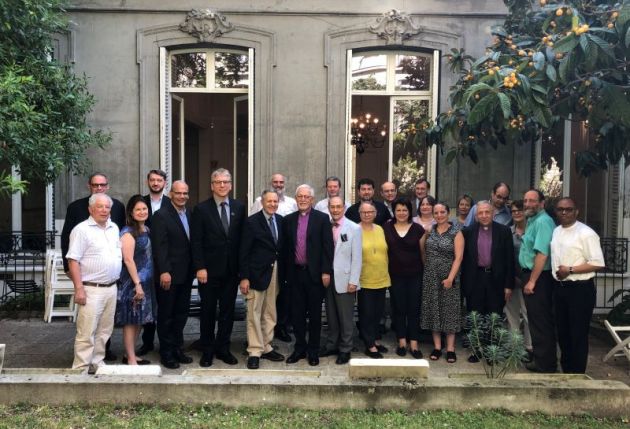World churches group and international Jewish committee restore relations after 20-year hiatus

The World Council of Churches representing more than 500 mainly Anglican, Orthodox and Protestant Christians and the International Jewish Committee for Interreligious Consultations have restored relations after a two-decades break.
"After a two-decade hiatus, the two groups have chosen to restore formal relations," the WCC and the IJCIC said after they met at a historic meeting on June 25-27 in Paris, France.
Among the issues that drove them to suspend their relations were differences over the Israeli-Palestinian conflict.
The meeting was held under the theme, "The normalization of hatred: challenges for Jews and Christians today" and in a joint communique they said it "took place at a time of challenges both to religious life in general and to each of our communities in their various contexts."
The two groups said it was taking place "at a time of challenges both to religious life in general and to each of our communities in their various contexts."
The WCC and IJCIC said they are representative bodies of their respective religious communities.
The meeting was convened by Rabbi Daniel Polish, chair of IJCIC, and Rev. Olav Fykse Tveit, general secretary of the WCC.
It was jointly chaired by Rabbi Noam Marans, vice chair of IJCIC, and Archbishop Vicken Aykazian, WCC executive committee member and a legate of the Armenian Apostolic Church.
"Among the issues that informed this gathering were: the rise of xenophobic nationalist movements in much of the world; suspicion of the agendas of religious communities and institutions, especially in Europe," they said.
Their joint message also spoke of the, "the resurgence of overt antisemitism; the prevalence of Islamophobia;" and "newly emerging anti-Christian attitudes."
They also discussed "the continuing non-resolution of the Israeli-Palestinian conflict; worldwide hostility to vulnerable minorities; and the shocking erosion of civil society in many places and ways."
"We are particularly horrified by the recent increase in murderous attacks on places of worship in different parts of the world," the two groups said.
They discussed the Israeli-Palestinian conflict and "it was recognized that there have sometimes been very real tensions between the positions of the WCC and IJCIC."
They said, "This meeting took place with acknowledgment of the development in both more constructive communications and the way that differences are conveyed publicly.
'OPENESS AND HONESTY'
"These discussions in Paris were characterized by openness, honesty, and an attempt to fully empathize with how profoundly important these issues are to Jews and Christians alike."
The groups also focused on their shared challenge to address injustice in the world.
"Our religious traditions mandate that we honour the integrity and humanity of all, welcome and care for the stranger, and resist evil. We are living at a time when this demands our courageous attention," reads their joint text.
The two groups also explored ways in which, working together, "our advocacy and interventions may be forces for good in the world."
They committed to addressing and opposing all forms of normalization of hatred, including antisemitism and attacks on religious communities.
Areas of possible collaboration included: mutual education; environmental concerns; and gender justice.
The IJCIC serves its constituent member organizations to maintain and develop relations with the Vatican's Commission on Religious Relations with the Jews, the Ecumenical Patriarchate and the World Council of Churches and other international religious bodies.
IJCIC's members are: American Jewish Committee (AJC), Anti-Defamation League (ADL), B'nai B'rith International (BBI), Central Conference of American Rabbis (CCAR), Israel Jewish Council on Interreligious Relations (IJCIR), Rabbinical Assembly (RA), Rabbinical Council of America (RCA), Union for Reform Judaism (URJ), Union of Orthodox Jewish Congregations of America (OU), United Synagogue of Conservative Judaism (USCJ), and World Jewish Congress (WJC).
The World Council of Churches is a worldwide fellowship of 350 member churches which represents more than half a billion Christians around the world.
